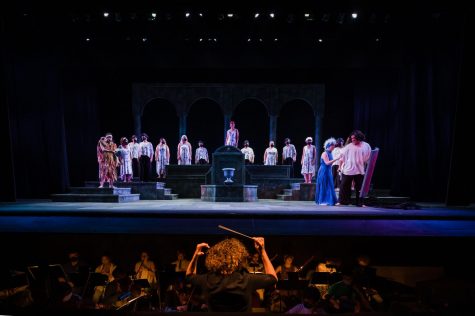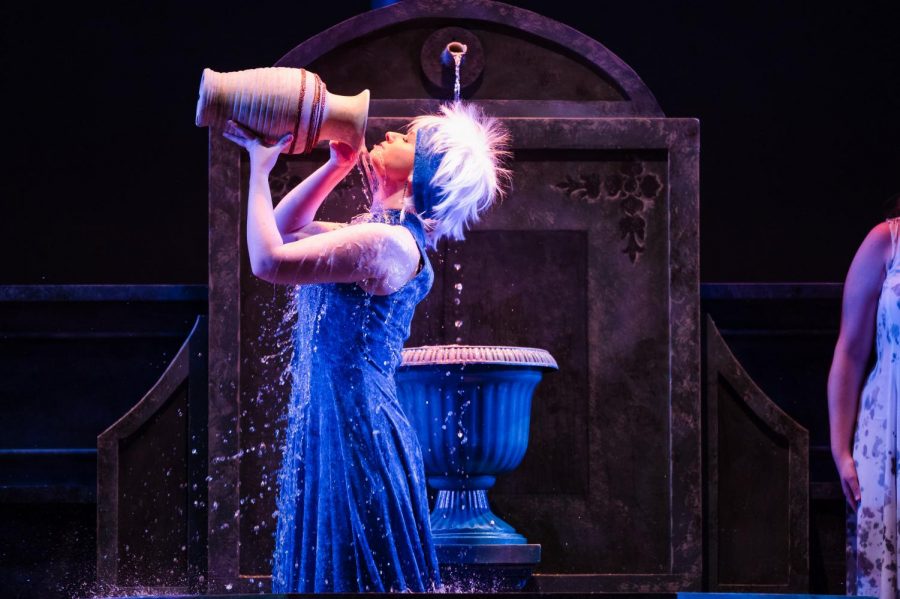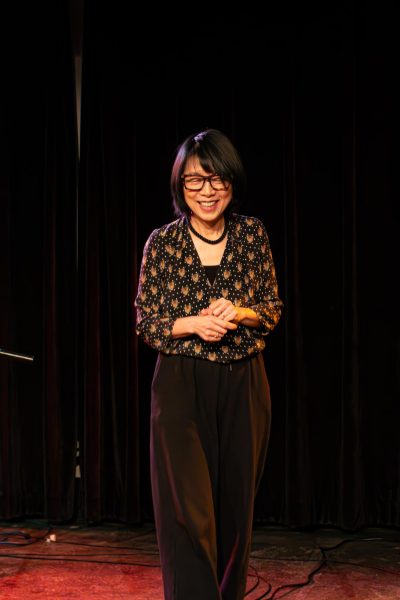Oberlin Opera Theater Hosts First Show Since 2019
This weekend, Oberlin Opera Theater will perform Mozart’s 1788 recomposition of Handel’s famous retelling of the ancient Greek love story between Acis, a young shepherd, and Galatea, a beautiful sea nymph.
Yesterday, the Oberlin Opera Theater hosted its first fully-staged, in-person performance since fall 2019. George Handel’s Acis and Galatea. The show, featuring Conservatory students in the Vocal Studies Division and the Oberlin Orchestra, is directed by Professor of Opera Theater Jonathon Field and will run through Nov. 14. The opera, Handel’s most popular dramatic work by far, was first written and performed in 1718 and sets an ancient Greek myth in the pastoral English countryside. As the first act begins with the elegant “Sinfonia,” the audience is introduced to two young lovers, the shepherd Acis and the sea nymph Galatea. After the two profess their undying love for each other, the pair are tragically separated by the jealous cyclops Polyphemus. The music soon turns mournful and plaintive, reflective of the opera’s emotional commentary on the transformations of love and loss.
“The ultimate message is that love conquers all, and that after staggering losses there is still some kind of hope for the future,” Field said.
The love story is fantastical, which is characteristic of Handel’s works. In directing the show, Field and guest conductor Matilda Hofman had to in- corporate a great deal of creativity in order to execute the story successfully.
“With Handel, his pieces usually have an element of fantasy,” Field said. “So the problem always is presenting that to the audience in a way that makes them accept what’s going on.”
Field and Hofman approached this challenge eagerly, excited to shape the final product into something special. They explored the magical aspects through movement and physical expression on stage.

14. (Photo by Yevhen Gulenko)
“There’s a kind of stylistic arc to the piece,” Hofman said. “It’s sort of ar- artificial, in a certain way, in the way it uses gestures. And then as it evolves, it becomes much more natural; it becomes very emotional at the end.”
Another important factor Field kept in mind while directing the show was the lingering effects of COVID-19. When the show was chosen last spring, there was no clear vision of what the performance would look like this fall.
“We wanted a piece that could … be filmed and also had a smaller cast and could be recorded easily, if it had to go that way,” he said.
Ultimately, Field made the decision to double-cast three of the main characters: Galatea, Acis, and Damon. In a filmed version, the characters’ faces would have been digitally edited to transition from one cast to the next. Luckily, the show is able to go on in-person, though Field wanted to keep both casts to give more students the opportunity to perform.
Even without digitally transitioning actors’ faces, Field found a way to blend the two casts seamlessly from Act 1 to Act 2. In the final scene of Act 1, the stage is filled with energy and happiness as the love between Acis and Galatea builds. Then, the second cast of Acis and Galatea comes on stage and stands in front of their coun- parts. They mimic each other’s movements, another example of the way Field shifted the physical expression onstage to add a unique element to the show.
Conservatory third-year Kylie Kreucher plays Damon in the second act. She dominates the stage with emotionally charged movements and facial expressions. Damon is traditionally a male character, but Field and Hofman adjusted the music for a female voice to accommodate the student performers. Kreucher enjoyed the chance to tap into the villainous side of her character, a role that female voices in opera do not often get assigned.
“I really have been thinking in the mind of the character and diving into these emotions like jealousy and resentment and anger and spite,” Kreucher said. “Those are things that we experience in our everyday lives that we don’t necessarily want to highlight or showcase.”
As Damon, Kreucher’s goal is to gain the audience’s sympathy. Damon inflaming Polyphemus’ jealousy represents a darker side of the human emotional experience. Watching this character on stage can serve as a reality check and an opportunity for the audience to reflect on their own emotional reactions.
“We can see, through my character, the consequences of what happens when we’re blinded by jealousy and anger, and how that can lead to regret,” Kreucher said.
Kreucher and the rest of the cast put in extra effort to make the characters feel relatable because COVID-19 restrictions remain obvious on stage. Although soloists can perform freely without masks, the entire chorus remains masked throughout the whole show.
Participating in a partially-masked show led Conservatory second-year Benhur Ghezehey to consider the story through the lens of the pandemic. He believes we can learn from the way Galatea turns her grief into something positive — a fountain — and apply it to our own lives.
“We know people who have lost loved ones,” Ghezehey said. “We might even have some people we lost, and the whole point of this opera is you can’t just forget grief, but can change this grief into something positive. … I hope people come [to] this opera and learn from what Galatea has done with her grief and take a moment to reflect.”
The show is open through Sunday. Information about the show and ticket sales can be found on the Oberlin Opera Theater website.











